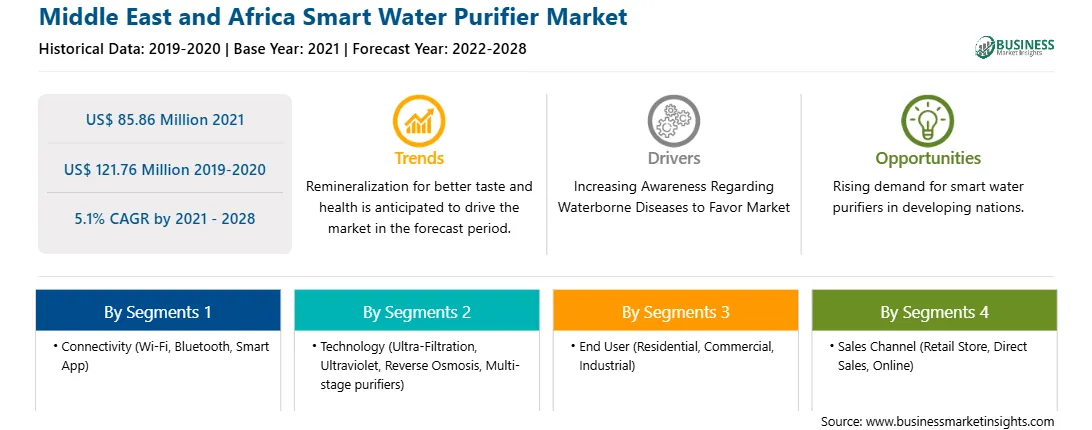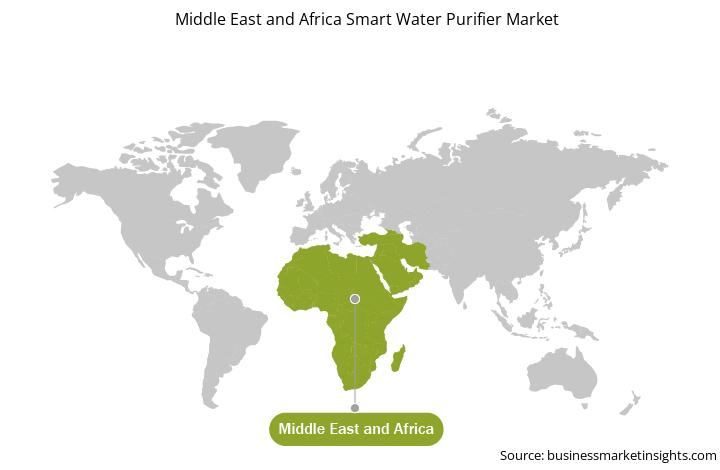In the bottled water industry, alkaline and pH-balanced water have become increasingly popular, and smart water purifiers are competing rigorously. Spiraling demand for wellness products and commodities is strengthening their cause, with businesses throughout the consumer-packaged-goods (CPG) industry competing for a piece of the US$ 30 billion spent on supplementary health treatments by people across the region. Health concerns do not just drive the re-mineralization trend. The taste of water, particularly bottled water, is a contentious issue, and trace minerals are now widely recognized as an important flavor component. For instance, BWT uses unique magnesium technology to return magnesium to the water throughout the filtering process, ensuring a superior flavor. This is applicable not only for pure drinking water but also for other liquids, including coffee, espresso, and tea. These factors are likely to play a crucial role in the market growth in the upcoming years.
With the new features and technologies, vendors can attract new customers and expand their footprints in emerging markets. This factor is likely to drive the MEA smart water purifier market at a healthy CAGR during the forecast period.
The MEA smart water purifier market is analyzed on the basis of connectivity, technology, end user, sales channel, and country. Based on connectivity, the market is segmented into Wi-Fi, Bluetooth, and smart app. The Wi-Fi segment dominated the market in 2020, and the smart app segment is expected to report the fastest growth during the forecast period.
Based on technology, the market is segmented into ultra-filtration (UF), ultraviolet (UV), reverse osmosis, multi-stage purifiers, and others. The reverse osmosis segment dominated the market in 2020, and the multi-stage purifiers segment is expected to be the fastest growing one during the forecast period.
Based on end user, the market is segmented into residential, commercial, and industrial. The residential segment dominated the market in 2020, and the commercial segment is expected to register the fastest growth during the forecast period.
Based on sales channel, the market is segmented into retail stores, direct sales, and online stores. The retail store segment dominated the market in 2020. The online segment is expected to be the fastest growing one during the forecast period.
Based on country, the MEA smart water purifier market is classified into South Africa, Saudi Arabia, the UAE, and the Rest of the MEA.
3M; A.O. Smith Water Technologies; Coway USA, Inc; LG Electronics; Membrane Solutions, LLC; and Xiaomi Corporation are the leading companies in the MEA smart water purifier market.
Strategic insights for the Middle East and Africa Smart Water Purifier provides data-driven analysis of the industry landscape, including current trends, key players, and regional nuances. These insights offer actionable recommendations, enabling readers to differentiate themselves from competitors by identifying untapped segments or developing unique value propositions. Leveraging data analytics, these insights help industry players anticipate the market shifts, whether investors, manufacturers, or other stakeholders. A future-oriented perspective is essential, helping stakeholders anticipate market shifts and position themselves for long-term success in this dynamic region. Ultimately, effective strategic insights empower readers to make informed decisions that drive profitability and achieve their business objectives within the market.

| Report Attribute | Details |
|---|---|
| Market size in 2021 | US$ 85.86 Million |
| Market Size by 2028 | US$ 121.76 Million |
| Global CAGR (2021 - 2028) | 5.1% |
| Historical Data | 2019-2020 |
| Forecast period | 2022-2028 |
| Segments Covered |
By Connectivity
|
| Regions and Countries Covered | Middle East and Africa
|
| Market leaders and key company profiles |
The geographic scope of the Middle East and Africa Smart Water Purifier refers to the specific areas in which a business operates and competes. Understanding local distinctions, such as diverse consumer preferences (e.g., demand for specific plug types or battery backup durations), varying economic conditions, and regulatory environments, is crucial for tailoring strategies to specific markets. Businesses can expand their reach by identifying underserved areas or adapting their offerings to meet local demands. A clear market focus allows for more effective resource allocation, targeted marketing campaigns, and better positioning against local competitors, ultimately driving growth in those targeted areas.

The Middle East and Africa Smart Water Purifier Market is valued at US$ 85.86 Million in 2021, it is projected to reach US$ 121.76 Million by 2028.
As per our report Middle East and Africa Smart Water Purifier Market, the market size is valued at US$ 85.86 Million in 2021, projecting it to reach US$ 121.76 Million by 2028. This translates to a CAGR of approximately 5.1% during the forecast period.
The Middle East and Africa Smart Water Purifier Market report typically cover these key segments-
The historic period, base year, and forecast period can vary slightly depending on the specific market research report. However, for the Middle East and Africa Smart Water Purifier Market report:
The Middle East and Africa Smart Water Purifier Market is populated by several key players, each contributing to its growth and innovation. Some of the major players include:
The Middle East and Africa Smart Water Purifier Market report is valuable for diverse stakeholders, including:
Essentially, anyone involved in or considering involvement in the Middle East and Africa Smart Water Purifier Market value chain can benefit from the information contained in a comprehensive market report.